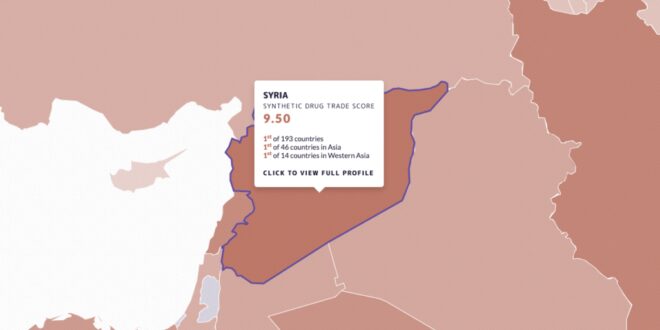Syria’s degree of involvement in the synthetic drug trade is the highest in the world, but the influence of neighbouring Lebanon should not be underestimated.
As the conflict in Syria has rolled on over the past decade, the country’s involvement in the synthetic drug trade has grown, and the country ranks highest for the market in the Global Organized Crime Index 2021. In particular, Syria plays a central role in the global trade in Captagon, an illegal and highly addictive amphetamine.
A myriad of actors take part in the trade, both in manufacturing and smuggling. As the Organized Crime Index’s analysis highlights, state actors are ‘the most dominant agents in facilitating illicit economies and inhibiting resilience to organized crime’. Syria is a vivid illustration of this, not only because it is one of the world’s worst-performing countries in terms of resilience (ranking 190th out of 193 in the Index), but also because actors affiliated with the regime of President Bashar al-Assad are the main Syrian stakeholders involved in the Captagon trade.
However, it would be misleading to focus only on Syrian actors as the dominant agents in this criminal market. Syria’s centrality in the trade is to a significant degree linked to another actor – the Lebanese militant group Hezbollah. To fully understand the dynamics of Syria’s involvement in the trade, we must examine its relationship with Lebanon.
Porous borders
Although Lebanon scores better than Syria in the Index in terms of resilience, its score of 8.0 (out of 10) for the country’s synthetic drug trade is very high. Both countries also have very high scores for the presence of state-embedded actors – 9.5 for Lebanon and 10 for Syria.
The Syrian conflict has made the border between the countries porous, with only nominal oversight by the Lebanese authorities, and restricted to official border crossings. Even there, de facto control of those crossings is carried out by Hezbollah – Lebanon’s most powerful political actor and the only group other than the Lebanese army given state legitimacy to possess weapons. In areas such as the northern Beqaa area of Lebanon, which neighbours Homs in Syria, the border is practically non-existent. Smuggling operations – involving drugs, weapons and people – occur in both directions across a number of illegal crossings.
On the Lebanese side, Hezbollah controls these illegal crossings; on the Syrian side, the Fourth Armoured Division of the Syrian Army and the Syrian military branch, which is part of the intelligence services, have a presence. These state actors often cooperate with Hezbollah and others (including local militias and Syrian and Lebanese businesspeople) involved in the Captagon trade. Hezbollah’s political dominance in Lebanon, including its representation in Lebanese state institutions, and Lebanon’s flawed political system that enables corruption have allowed the group to engage in illicit transactions with impunity.
Hezbollah’s involvement in the transnational drug trade precedes the Syrian conflict, but the war provided the group with an opportunity to consolidate their position, taking advantage of border fragility and access to the Syrian Port of Latakia. Hezbollah’s military involvement in Syria pushed the group to seek almost full control of the border, which prompted the creation of more drug factories in Syrian regions close to Lebanon. In some cases, these production sites are under the direct supervision of Hezbollah, the Syrian Fourth Division or both.
A regional perspective
Although Hezbollah regularly collaborates with Syrian state and non-state actors in border smuggling operations, the group also works alone, handling all aspects of Captagon smuggling, including of chemicals used in the manufacture of the drug. In cases where Captagon is smuggled by sea out of Syria, this is mainly through Latakia, which is under the supervision of the Syrian regime (as opposed to the Port of Tartous, which is under Russian supervision). On some occasions, Captagon has also been shipped out of Lebanon, with Hezbollah mainly in charge of the trade, supported by their de facto control of the port of Beirut and the international airport in the city.
Hezbollah’s extensive experience in the global drug trade has been a resource for Syrian regime actors who have partnered with the militant group in the Captagon trade. Some of the drug factories that Hezbollah and the Fourth Division oversee jointly within Syria are located in or near border towns that Hezbollah has taken over, including those in which the group led a process of demographic shifts that emptied them of their original residents to be replaced with Hezbollah and Syrian regime loyalists.
Intercepting the drug trade in Syria must therefore take into consideration the wider regional picture that includes Lebanon; taking a country-based approach solely focused on Syria is not enough. Although al-Assad’s regime benefits from the trade, the share of the profits going to Hezbollah is significant. International stakeholders seeking to counter this illicit trade must adopt a regional perspective, taking into account the involvement of these multiple actors.
 Eurasia Press & News
Eurasia Press & News


